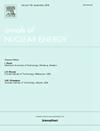Research on optimization of steam generator level control in startup process based on intelligent algorithm
IF 2.3
3区 工程技术
Q1 NUCLEAR SCIENCE & TECHNOLOGY
引用次数: 0
Abstract
Automatic steam generator (SG) level control during pressurized water reactor (PWR) startup is crucial for safety. The poor adaptability of fixed-parameter SG level controllers of main feedwater system (TFM), the manual SG level control by auxiliary feedwater system (TFA), and the manual switching between TFA and TFM, have limitations for the startup process automation. An intelligent control scheme is proposed, integrating gain-scheduled proportional-integral-derivative (PID) controller tuning via non-dominated sorting genetic algorithm II and fuzzy logic-based switching scheme. Simulation results demonstrate that the optimized TFM level control scheme reduces the average settling time by 47.3% under load step disturbance conditions, and enhances disturbance rejection. The designed TFA level control system can maintain level stability during startup. The fuzzy controller achieves bumpless switching between systems. The approach reduces average maximum level deviation by 39.2% and average settling time by 13.4% in startup processes, offering a practical solution to enhance PWR automation.
基于智能算法的蒸汽发生器启动过程液位控制优化研究
压水堆启动过程中蒸汽发生器液位的自动控制是保证反应堆安全运行的关键。主给水系统固定参数SG液位控制器适应性差,辅助给水系统手动控制SG液位,辅助给水系统与辅助给水系统手动切换,限制了启动过程自动化。提出了一种基于非支配排序遗传算法的增益调度比例积分导数(PID)控制器整定与基于模糊逻辑的切换方案相结合的智能控制方案。仿真结果表明,优化后的TFM电平控制方案在负荷阶跃扰动条件下平均沉降时间缩短了47.3%,抗干扰能力增强。所设计的TFA液位控制系统能够在启动过程中保持液位稳定。模糊控制器实现了系统间的无碰撞切换。该方法在启动过程中平均最大液位偏差减少39.2%,平均沉降时间减少13.4%,为提高压水堆自动化提供了实用的解决方案。
本文章由计算机程序翻译,如有差异,请以英文原文为准。
求助全文
约1分钟内获得全文
求助全文
来源期刊

Annals of Nuclear Energy
工程技术-核科学技术
CiteScore
4.30
自引率
21.10%
发文量
632
审稿时长
7.3 months
期刊介绍:
Annals of Nuclear Energy provides an international medium for the communication of original research, ideas and developments in all areas of the field of nuclear energy science and technology. Its scope embraces nuclear fuel reserves, fuel cycles and cost, materials, processing, system and component technology (fission only), design and optimization, direct conversion of nuclear energy sources, environmental control, reactor physics, heat transfer and fluid dynamics, structural analysis, fuel management, future developments, nuclear fuel and safety, nuclear aerosol, neutron physics, computer technology (both software and hardware), risk assessment, radioactive waste disposal and reactor thermal hydraulics. Papers submitted to Annals need to demonstrate a clear link to nuclear power generation/nuclear engineering. Papers which deal with pure nuclear physics, pure health physics, imaging, or attenuation and shielding properties of concretes and various geological materials are not within the scope of the journal. Also, papers that deal with policy or economics are not within the scope of the journal.
 求助内容:
求助内容: 应助结果提醒方式:
应助结果提醒方式:


